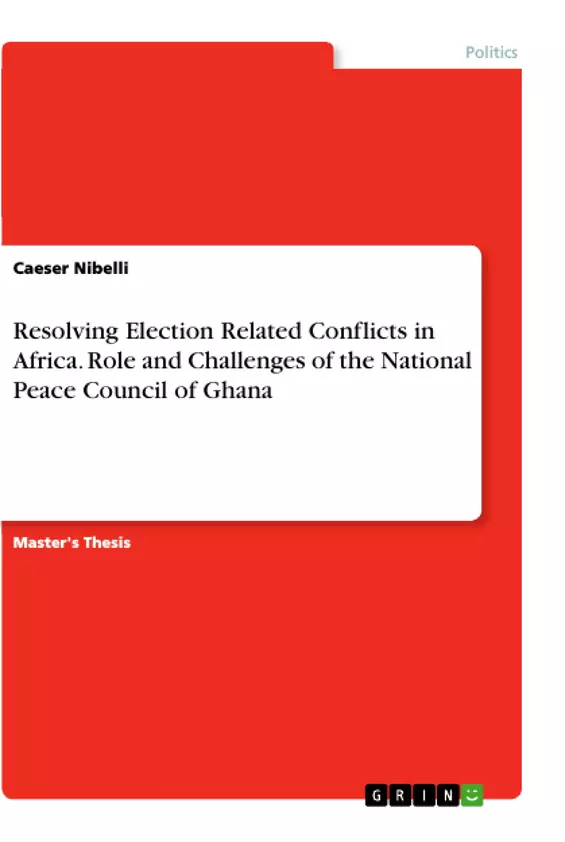This study examines the causes of electoral conflicts in Ghana and Africa, and the role and challenges of the National Peace Council in resolving election-related conflicts.
In many African countries, both the economic and political authorities are confiscated and held in the hands of some corrupt leaders who through the use of force control the destiny of their countries. Since the adoption of multiparty systems in some African countries, most elections have been tarnished by violence and by political antagonists who continue to question not only the fairness and the transparency of elections but also the validity of the electoral systems of their countries. Ghana’s elections for some time now have become violent resulting in disputes. A typical case of this situation was the 2012 elections which ended up in the Supreme Court as a dispute. In all of these conflicts, the role of the National Peace Council cannot be over-emphasized. The Council played an important role before, during and after elections. This contributed in the peace that the Ghana experienced during and after elections. In the light of the key role of the Council played in ensuring peace before, during and after elections, there are a number of challenges that confronted the Council. This study examines the specific role played by the National Peace Council (NPC) in ensuring peace in elections. The study discussed the challenges that affected the work of the Council such as limited funding to initiate activities and inadequate staff to help carry out its functions. The methodology adopted in this study is the qualitative case study approach which enabled the study to analyze the findings by relying mostly on secondary data to make its findings. Literatures from secondary data were reviewed to answer research questions.
The findings of this study confirm that, the role played by the National Peace Council (NPC) yielded positive results in ensuring the peace of the country throughout the electoral period which other Africa countries can emulate to prevent election-related conflicts.
Inhaltsverzeichnis (Table of Contents)
- DEDICATION
- ACKNOWLEDGEMENTS
- LIST OF ABBREVIATIONS
- ABSTRACT
- CHAPTER ONE: INTRODUCTION
- 1.2 STATEMENT OF THE PROBLEM
- 1.3 RESEARCH QUESTIONS
- 1.4 OBJECTIVES OF THE STUDY
- 1.4.1 General Objective
- 1.4.2 Specific Objectives
- 1.5 METHODOLOGY
- 1.5.1 Research Design
- 1.5.2 Research Approach and Strategy
- 1.5.3 Study Population
- 1.5.4 Sample Size and Sampling Techniques
- 1.5.5 Data Collection and Research Instrument
- 1.5.6 Method of Data Analysis
- 1.5.7 Data Verification
- 1.5.8 Ethical Consideration
- 1.6 THEORETICAL FRAMEWORK
- 1.6.1 Conflict Cycle Theory of Election
- 1.6.2 Theory of Conflict and Conflict Resolution
- 1.7 LITERATURE REVIEW
- 1.7.1 Electoral Conflicts in Africa
- 1.7.2 Elections and Conflicts in Ghana
- 1.7.3 The Youth and Elections in Ghana
- 1.7.4 The National Peace Council (NPC) of Ghana and Conflict Resolution
- 1.8 SIGNIFICANCE OF THE STUDY OF DEFENSE AND INTERNATIONAL POLITICS
- 1.9 LIMITATIONS OF THE STUDY
- 1.10 ORGANIZATION OF CHAPTERS
- REFERENCES
- CHAPTER TWO: ELECTIONS AND CONFLICTS IN AFRICA
- 2.1 INTRODUCTION
- 2.2 THE ELECTORAL SYSTEM IN AFRICA
- 2.3 THE NATIONAL ELECTORAL BODIES AND ELECTIONS
- 2.4 SECURITY FORCES AND ELECTIONS IN AFRICA
- 2.5 ETHNICITY AND AFRICA ELECTIONS
- 2.6 INCUMBENCY AND ELECTORAL CONFLICTS IN AFRICA
- 2.7 CONCLUSION
- REFERENCES
- CHAPTER THREE: THE POTENTIAL CAUSES OF ELECTION-RELATED
CONFLICTS GHANA
- 3.1 INTRODUCTION
- 3.2 BACKGROUND OF ELECTIONS IN GHANA
- 3.3 ETHNICITY AND ELECTION-RELATED CONFLICTS IN GHANA
- 3.4 POLITICAL PARTIES AND ELECTION-RELATED CONFLICTS
Zielsetzung und Themenschwerpunkte (Objectives and Key Themes)
This dissertation explores the role of the National Peace Council of Ghana in resolving potential election-related conflicts in Africa. It aims to assess the effectiveness of the Council's efforts and identify the challenges it faces in fulfilling this mandate. The research also seeks to understand the factors contributing to electoral violence in Africa and Ghana, specifically, with a focus on the role of ethnicity, political parties, and incumbency.
- The role of the National Peace Council of Ghana in conflict resolution
- The factors contributing to electoral violence in Africa and Ghana
- The challenges faced by the National Peace Council in fulfilling its mandate
- The impact of ethnicity and political parties on election-related conflicts
- The influence of incumbency on electoral violence
Zusammenfassung der Kapitel (Chapter Summaries)
Chapter One provides an introduction to the study, outlining the research problem, objectives, methodology, and theoretical framework. It also reviews relevant literature on electoral conflicts in Africa and Ghana, including the role of the National Peace Council. Chapter Two examines the electoral system in Africa, highlighting the challenges associated with elections and the potential for conflict. It discusses the role of national electoral bodies, security forces, ethnicity, and incumbency in contributing to electoral violence. Chapter Three focuses on the potential causes of election-related conflicts in Ghana. It explores the historical context of elections in Ghana, the role of ethnicity, political parties, and the impact of these factors on electoral stability.
Schlüsselwörter (Keywords)
The main keywords and focus topics of this work include: election-related conflicts, Africa, Ghana, National Peace Council, conflict resolution, electoral violence, ethnicity, political parties, incumbency, electoral system, security forces, and national electoral bodies.
- Arbeit zitieren
- Caeser Nibelli (Autor:in), 2017, Resolving Election Related Conflicts in Africa. Role and Challenges of the National Peace Council of Ghana, München, GRIN Verlag, https://www.grin.com/document/516717



